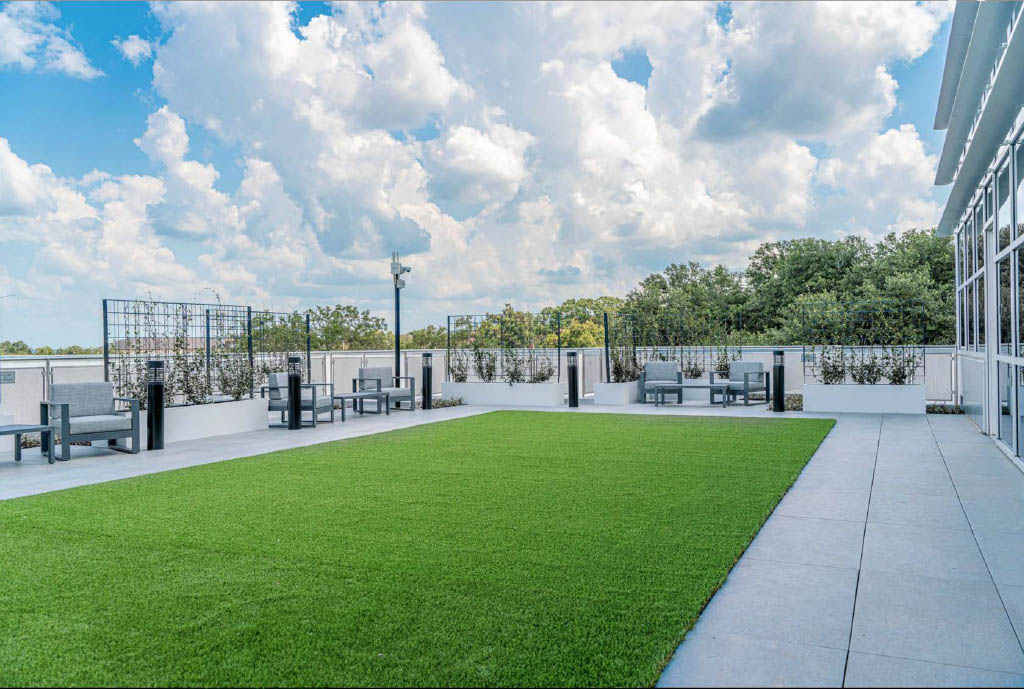What Should Be Included in Your Commercial Maintenance Contract
A properly structured commercial landscape maintenance agreement should provide clear expectations and comprehensive coverage. Here’s what you should expect to find in a professional maintenance contract:
Regular Mowing Services - Professional agreements specify mowing frequency based on seasonal growth patterns rather than rigid schedules. This typically includes weekly mowing during peak growing seasons and adjusted frequency during slower growth periods. This approach ensures your property always looks its best without unnecessary service visits.
Complete Cleanup - Each service visit should include thorough cleanup, including blowing off hardscapes and removing debris. Proper maintenance includes clearing all landscape debris from walkways, parking areas, and building entrances after each service, ensuring your property maintains a professional appearance at all times.
Detailed Bed Maintenance - Proper bed care goes beyond occasional weeding. Your contract should include regular weeding, mulch management, and trimming of ornamentals. Comprehensive bed care with attention to plant health and appearance maintains the refined look that distinguishes truly professional landscapes.
Irrigation System Checks - Basic irrigation inspection should be included in regular maintenance visits. Visual irrigation checks during each visit help identify potential issues before they compromise plant health or waste water. This proactive approach prevents the common pattern of discovering problems only after plants show stress.
Seasonal Services - Your agreement should address seasonal needs like leaf removal, spring cleanup, and preparing for winter. Annual maintenance plans should include scheduled seasonal services appropriately timed for your climate patterns, ensuring your property transitions smoothly between seasons.
Communication Protocol - Professional contracts clearly outline how and when you’ll receive service updates and property assessments. Regular reports documenting current conditions, completed services, and recommendations with clear priorities create valuable documentation for property owner reporting and budget planning.
What’s Typically NOT Included (But May Be Needed)
Understanding what’s not included in standard maintenance is equally important for proper budgeting and expectations:
Irrigation Repairs - While basic irrigation checks are standard, actual repairs typically involve additional charges. Clear, upfront pricing for irrigation repairs helps prevent surprises and allows for proper budgeting.
Fertilization and Plant Health Programs - Most basic contracts don’t include fertilization or disease/pest management. These services are essential for long-term landscape health but are usually provided as separate programs. Customized fertilization programs ensure proper nutrition for your specific plant material and soil conditions.
Enhancement Plantings - Seasonal color changes, replacement plants, and new landscape areas typically fall outside standard maintenance. Enhancement proposals should provide clear, itemized pricing for these improvements, making budget planning straightforward.
Tree Care Beyond Basic Pruning - Specialized tree services like deep-root fertilization or major pruning usually require separate agreements. These services require different expertise and equipment than standard maintenance and are typically priced separately.
One-Time Cleanup or Project Work - Major cleanups, storm damage response, or landscape renovations typically fall outside regular maintenance. When these needs arise, expect detailed proposals specifically addressing these services, often with priority scheduling for existing maintenance clients.
Red Flags to Watch For in Service Agreements
Recognizing problematic contract language can save you significant frustration. Be wary of:
Vague Service Descriptions - Beware of contracts that describe services in general terms without specifics. For example, “regular mowing as needed“ leaves too much room for interpretation. Look for agreements that clearly define service frequencies, standards, and seasonal adjustments.
No Specified Response Time - Quality contracts include guaranteed response times for service requests and emergencies. Priority response, with guaranteed timeframes for acknowledgment of requests and expedited scheduling for time-sensitive needs, indicates a professional approach.
Hidden Escalation Clauses - Some contracts include automatic price increases without clear notification. Multi-year agreements should clearly state any potential adjustments, with options for price protection that help with budgeting.
Minimal Reporting Requirements - Without regular reporting, you have no documentation of services performed. Regular detailed reports and periodic walkthroughs provide transparent communication and documentation that protects both parties.
Complicated Cancellation Terms - Beware of lengthy cancellation periods or excessive penalties. Reasonable notice periods protect both parties without locking you into unsatisfactory service.
Essential Questions to Ask Potential Landscape Partners
Before signing any maintenance agreement, ask these key questions:
“Who will be my regular point of contact?” - Consistent communication is essential for property management. A dedicated point of contact who knows your property ensures continuity in service delivery.
“How do you handle service issues?” - The response reveals much about company values. Look for providers who empower their teams to address concerns immediately, with clear escalation procedures when needed.
“Can you provide references from similar properties?” - Experienced providers will readily share references from comparable properties. Ask specifically for references managing properties similar to yours in size, type, and complexity.
“What makes your maintenance approach different?” - This question reveals whether a company has a thoughtful approach or just offers the basics. Listen for evidence of systems, training, and quality control rather than generic assurances.
“How do you train and retain your maintenance teams?” - Staff turnover often leads to inconsistent service. Companies with strong employee retention typically deliver more consistent results without the learning curve that comes with frequent staff changes.
Finding the Right Partner
At Landmark Landscape Group, we believe that transparency in service agreements creates successful long-term partnerships. We’ve maintained commercial properties across Texas for over 15 years, developing maintenance programs that balance comprehensive care with budget realities. Our detailed contracts eliminate surprises and establish clear expectations, while our experienced teams deliver consistent, professional results.
For commercial property managers seeking reliable landscape maintenance, the right provider combines clear agreements, consistent communication, and professional execution. By understanding what should be included in your maintenance contract and asking the right questions, you can find a landscape partner that enhances your property’s value and appearance while simplifying your property management responsibilities.










.jpg)
.jpg)
.jpg)
